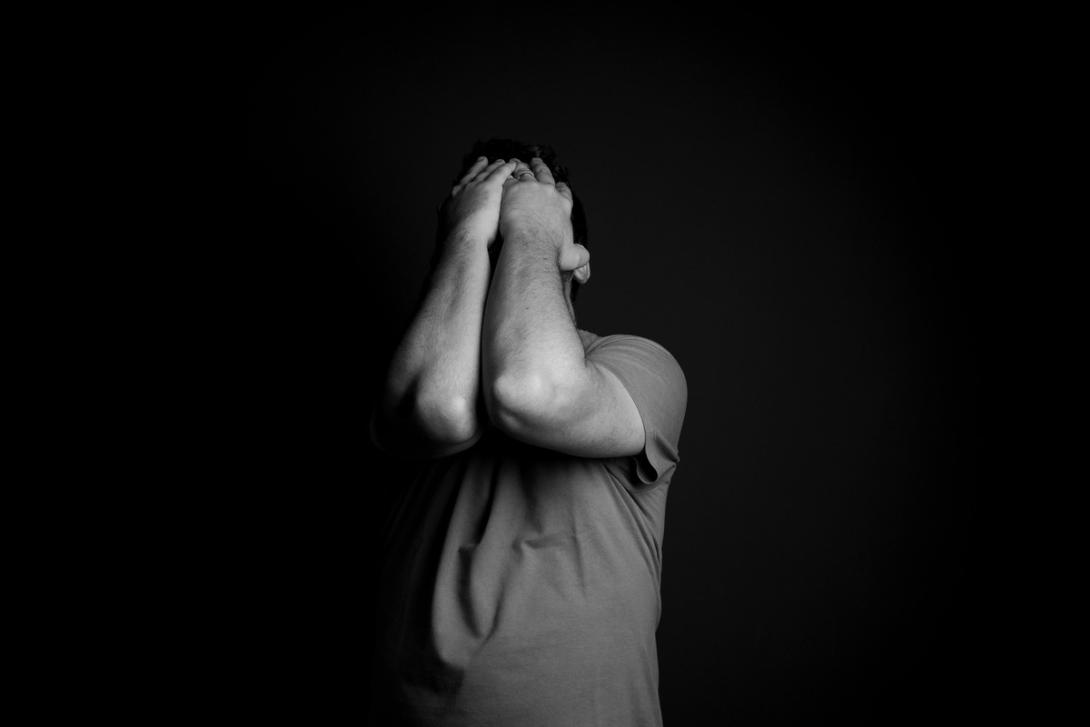
A chasm between precept and practice can exist only because of two reasons: either those entrusted with the execution of the policy are insincere, or the policy is not worth the paper it is written on. It is utopia and imaginary and has no relevance to the facts of life. Its diagnosis is faulty, and its prescription wanting.
Fundamentals of Modern Civilization
When the surge of technological advancement and globalization opened a new chapter in the history of civilization, lofty hopes were entertained about the future of mankind. The inevitability of progress became a fundamental belief of modern society. The three tenets of modernism are:
- Denial of supernatural powers and confidence in humanity's unlimited potential.
- Belief that society can be transformed through changes in the environment, economics, and education.
- The inevitability of progress, a concept that has inspired generations with new confidence in the future.
This last and most important concept became a secular substitute for religious faith. Politicians, economists, and futurists alike promised that today is better than yesterday and tomorrow will be better than both. Progress was declared inevitable, with human nature evolving for the better, and soon a time would come when poverty would be eradicated, crime abolished, and happiness would prevail.
But the realities of today tell a different story. Modern problems—crime, inequality, and moral decay—are spreading at an alarming rate. Evidence to the contrary of these high hopes continues to accumulate.
Crime in the USA and UK[1]
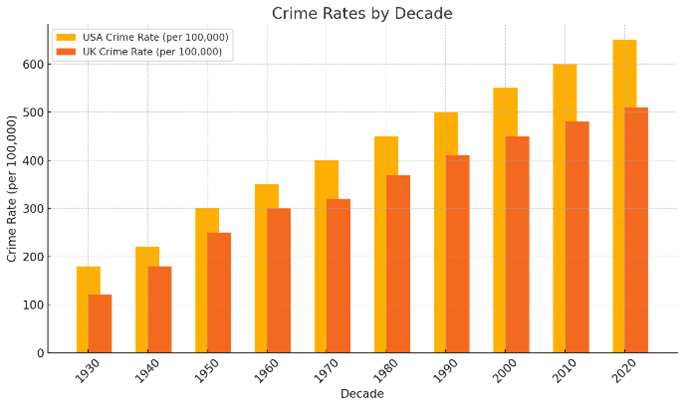
Recent data on crime rates offers a stark reminder that modern society has yet to find solutions to its core issues:
- United States: The FBI's Uniform Crime Reporting (UCR) program revealed a 30% surge in murders between 2019 and 2020, the highest increase ever recorded. Property crimes and violent offenses also remain widespread, with young people disproportionately involved in criminal activity.
- United Kingdom: According to the UK Office for National Statistics, knife crime increased by 84% between 2014 and 2020, and cybercrime saw a dramatic rise, with fraud and online offenses now accounting for a significant proportion of all crime.
The disturbing rise in violent crime, especially among youth, suggests that something is fundamentally wrong in societies that claim progress. The high hopes of moral and social improvement have not come true. Instead, crime has become more sophisticated and widespread in the modern era.
Decade | USA Crime Rate (per 100,000) | UK Crime Rate (per 100,000) |
1930 | 180 | 120 |
1940 | 220 | 180 |
1950 | 300 | 250 |
1960 | 350 | 300 |
1970 | 400 | 320 |
1980 | 450 | 370 |
1990 | 500 | 410 |
2000 | 550 | 450 |
2010 | 600 | 480 |
2020 | 650 | 510 |
Substance Abuse and Addiction[2]
The modern world has seen a steady rise in substance abuse, another indicator of societal decline:
- United States: Recent data from the CDC highlights a record-breaking surge in drug overdose deaths, with more than 93,000 fatalities in 2020 alone, primarily driven by opioids. Alcohol-related deaths also continue to rise, with per capita consumption of alcohol in the U.S. reaching 9.56 liters in 2020, a concerning number.
- United Kingdom: The UK has seen similar patterns, with drug deaths reaching their highest level since records began, increasing by 60% since 2010. Alcohol consumption per capita also remains elevated, with 10.51 liters in 2015, a slight improvement from previous years but still indicative of widespread alcohol abuse.
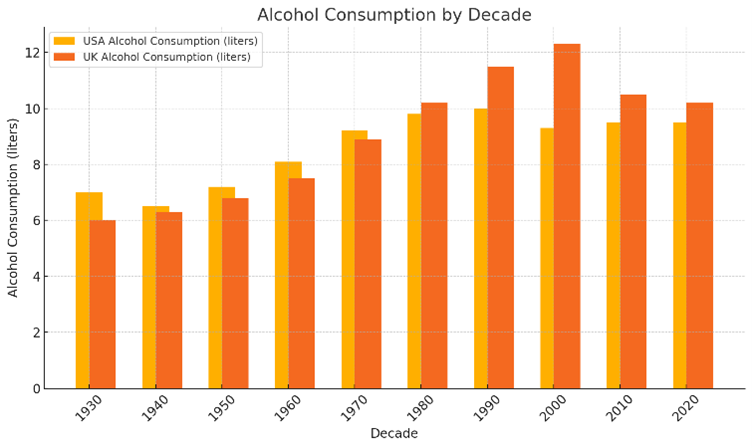
These figures reveal a deep-seated societal issue. Substance abuse, particularly among the youth, continues to rise in both countries, signaling that modern societies have failed to address this growing public health crisis.
Decade | USA Alcohol Consumption (liters) | UK Alcohol Consumption (liters) |
1930 | 7 | 6 |
1940 | 6.5 | 6.3 |
1950 | 7.2 | 6.8 |
1960 | 8.1 | 7.5 |
1970 | 9.2 | 8.9 |
1980 | 9.8 | 10.2 |
1990 | 10 | 11.5 |
2000 | 9.3 | 12.3 |
2010 | 9.5 | 10.5 |
2020 | 9.5 | 10.2 |
Economic Inequality: Wealth Distribution in the USA and UK[3]
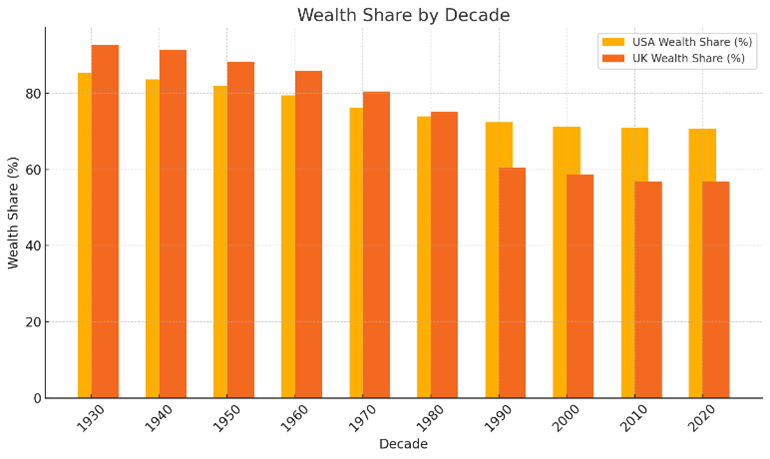
An analysis of recent data on wealth distribution reveals that despite economic growth, inequality remains a persistent problem:
- United States: The richest decile (top 10%) of Americans currently holds 70.68% of the nation's wealth, a concentration that has remained steady in recent decades despite slight fluctuations. This extreme wealth disparity has only widened since the 2008 financial crisis and the COVID-19 pandemic.
- United Kingdom: A similar situation exists in the UK, where the richest decile holds 56.96% of the nation's wealth as of 2022. Despite economic growth, the concentration of wealth among the top 10% has led to growing discontent, especially among younger generations who struggle to access affordable housing and employment opportunities.
The unequal distribution of wealth in both countries highlights the failure of modern systems to create a more equitable society. Economic progress, touted as inevitable, has largely bypassed the majority of citizens, leading to a growing divide between the rich and the poor.
Decade | USA Wealth Share (%) | UK Wealth Share (%) |
1930 | 85.3 | 92.7 |
1940 | 83.7 | 91.4 |
1950 | 82.1 | 88.3 |
1960 | 79.5 | 86 |
1970 | 76.2 | 80.5 |
1980 | 74 | 75.2 |
1990 | 72.5 | 60.5 |
2000 | 71.3 | 58.7 |
2010 | 70.9 | 56.9 |
2020 | 70.7 | 56.9 |
The Crisis of Mental Health/ Suicide Rate[4]
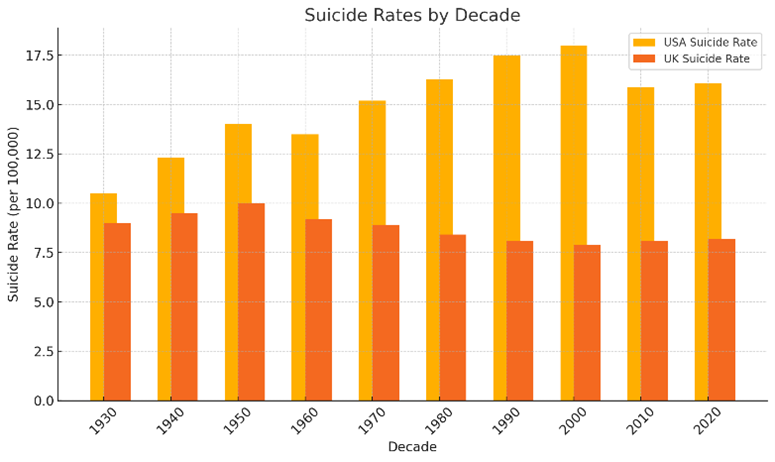
While technological advancements have improved physical health and life expectancy, mental health has declined rapidly:
- United States: Suicide rates have steadily increased, with the national rate rising from 11 per 100,000 in 2000 to 16.1 per 100,000 in 2019. Anxiety, depression, and suicide among teens and young adults have skyrocketed, exacerbated by social media and the pressures of modern life.
- United Kingdom: Mental health statistics are similarly alarming. The UK reported a 25% increase in antidepressant use between 2015 and 2021, and suicide rates remain high, particularly among men. The Mental Health Foundation has described the state of mental health in the UK as a "silent pandemic."
These trends indicate that the so-called progress of modern society has come at a cost—mental well-being has deteriorated even as material wealth has grown for some
| Decade | USA Suicide Rate | UK Suicide Rate |
1930 | 10.5 | 9 |
1940 | 12.3 | 9.5 |
1950 | 14 | 10 |
1960 | 13.5 | 9.2 |
1970 | 15.2 | 8.9 |
1980 | 16.3 | 8.4 |
1990 | 17.5 | 8.1 |
2000 | 18 | 7.9 |
2010 | 15.9 | 8.1 |
2020 | 16.1 | 8.2 |
The Harsh Reality: A Disillusionment
Despite all the lofty promises of modern civilization, society faces numerous challenges:
- Rising crime rates, particularly violent offenses among youth.
- Increasing substance abuse and addiction, reflecting a societal moral decay.
- Persistent wealth inequality, with the richest continuing to amass a disproportionate share of national wealth.
- Deteriorating mental health, particularly among younger generations.
Key Takeaways
- Crime: Violent crime and property offenses are on the rise in both the United States and the United Kingdom, particularly among young people.
Substance Abuse: Both alcohol and drug-related deaths are climbing, indicating that modern societies have failed to address public health crises.
Wealth Inequality: The richest 10% continue to hold a significant proportion of national wealth, exacerbating economic inequality.
Mental Health: Mental health has declined sharply in both countries, with increasing suicide rates and widespread depression and anxiety, particularly among youth.
Conclusion
The idea that human progress is inevitable has been exposed as a fallacy. The real picture reveals that while there may be advancements in technology, the moral and social fabric of society is in decline. Rising crime, substance abuse, wealth inequality, and mental health crises paint a grim picture of a society in need of deep reflection and reform. Only by returning to fundamental moral values and addressing these core issues can we hope to reverse the troubling trends of the modern world.
References
[1] WDI
[2]https://datacatalog.worldbank.org/public-licenses#cc-by
[3] https://ourworldindata.org/grapher/wealth-share-richest-10-percent?country=~USA
[4] https://datacatalog.worldbank.org/public-licenses#cc-by


